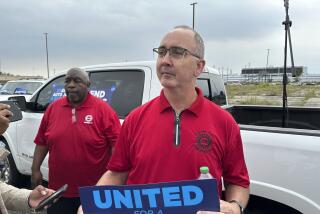Lawsuits Claim Ford, GM Aided Nazi War Effort
WASHINGTON — Three years after Swiss banks became the target of a worldwide furor over their business dealings with Nazi Germany, major American car companies find themselves embroiled in a similar debate.
Like the Swiss banks, the U.S. car companies have vigorously denied that they assisted the Nazi war machine or significantly profited from the use of forced labor at their German subsidiaries during World War II. But historians and lawyers researching class-action suits on behalf of former prisoners of war are busy amassing evidence of collaboration by the auto makers with the Nazi regime.
The Ford Motor Co. has also prepared for litigation, involving dozens of historians, lawyers and researchers to fight a civil case brought by lawyers in Washington and New York who specialize in extracting large cash settlements from banks and insurance companies accused of defrauding Holocaust victims.
“General Motors was far more important to the Nazi war machine than Switzerland,” said Bradford Snell, who has spent two decades researching a history of the world’s largest auto maker. “Switzerland was just a repository of looted funds. GM was an integral part of the German war effort. The Nazis could have invaded Poland and Russia without Switzerland. They could not have done so without GM.”
Both General Motors and Ford insist that they bear little or no responsibility for the operations of their German subsidiaries, which controlled 70% of the German car market at the outbreak of war in 1939 and rapidly retooled themselves to become suppliers of war materiel to the German army.
But documents discovered in German and American archives show that, in certain instances, American managers of both GM and Ford went along with the conversion of their German plants to military production at a time when U.S. government documents show they were still resisting calls by the Roosevelt administration to step up military production in their plants at home.
New Impetus for Investigations
After three years of national soul-searching, Switzerland’s largest banks agreed in August to make a $1.25 billion settlement to Holocaust survivors, a step they had initially resisted. Far from dying down, however, the controversy over business dealings with the Nazis has given new impetus to long-standing investigations into issues such as looted art, unpaid insurance benefits and the use of forced labor at German factories.
These issues are not entirely new. Some of the allegations against GM and Ford surfaced during 1974 congressional hearings into monopolistic practices in the automobile industry.
Both Ford and General Motors declined requests for access to their wartime archives. Ford spokesman John Spellich defended the company’s decision to maintain business ties with Nazi Germany on the grounds that the U.S. government continued to have diplomatic relations with Berlin up until Pearl Harbor in December 1941. This was true for most companies with German subsidiaries. GM spokesman John F. Mueller said that General Motors lost day-to-day control over its German plants in September 1939 and “did not assist the Nazis in any way during World War II.”
When the U.S. Army liberated the Ford plants in Cologne and Berlin, they found destitute foreign workers confined behind barbed wire and documents extolling the “genius of the Fuehrer,” according to reports filed by soldiers at the scene. A U.S Army report by investigator Henry Schneider dated Sept. 5, 1945, accused the German branch of Ford of serving as “an arsenal of Nazism, at least for military vehicles” with the “consent” of the parent company in Dearborn, Mich.
Ford spokesman Spellich described the Schneider report as “a mischaracterization” of the activities of the parent company and noted that Dearborn managers were frequently kept in the dark by their German subordinates over events in Cologne.
After the outbreak of war in September 1939, General Motors and Ford subsidiaries became crucial to the German military, according to contemporaneous German documents and postwar investigations by the U.S. Army. James Mooney, the GM director in charge of overseas operations, had discussions with Hitler in Berlin two weeks after the German invasion of Poland.
Typewritten notes by Mooney show that he was involved in the partial conversion of the principal GM automobile plant at Russelsheim to production of engines and other parts for the Junker “Wunderbomber,” a key weapon in the German air force, under a government-brokered contract between Opel and the Junker airplane company. Mooney’s notes show that he returned to Germany the following February for further discussions with Luftwaffe commander Hermann Goering and a personal inspection of the Russelsheim plant.
Mooney’s involvement in the conversion of the Russelsheim plant undermines claims by General Motors that the American branch of the company had nothing to do with the Nazi rearmament effort. In congressional testimony in 1974, GM maintained that American personnel resigned from all management positions in Opel following the outbreak of war in 1939 “rather than participate in the production of war materials.”
However, according to documents of the Reich Commissar for the Treatment of Enemy Property, the American parent company continued to have some say in the operations of Opel after September 1939. The documents show that the company issued a general power of attorney to an American manager, Pete Hoglund, in March 1940. Hoglund did not leave Germany until a year later. At that time, the power of attorney was transferred to a prominent Berlin lawyer named Heinrich Richter.
GM spokesman Mueller declined to answer questions from The Washington Post on these questions.
The Nazis had a clear interest in keeping Opel and German Ford under American ownership for as long as possible, despite growing hostility between Washington and Berlin. By the time of the bombing of Pearl Harbor in December 1941, the American stake in German Ford had declined to 52%, but Nazi officials argued against a complete takeover. A memorandum to plant managers dated Nov. 25, 1941, acknowledged that such a step would deprive German Ford of “the excellent sales organization” of the parent company and make it more difficult to bring “the remaining European Ford companies under German influence.”
Protecting Their German Investments
Documents suggest that the principal motivation of both companies during this period was to protect their investments. An FBI report dated July 23, 1941, quoted Mooney as saying that he would refuse to take any action that might “make Hitler mad.”
“Mooney probably thought that the war would be over very quickly, so why should we give our wonderful company away?” said German researcher Anita Kugler, who used Nazi archives to trace the company’s dealings with Nazi Germany.
Even though GM officials were aware of the conversion of its Russelsheim plant to aircraft engine production, they resisted such conversion efforts in the United States, telling shareholders that their automobile assembly lines in Detroit were “not adaptable to the manufacture of other products” such as planes, according to a company document discovered by Snell. In June 1940, after the fall of France, Henry Ford personally vetoed a U.S. government-approved plan to produce Rolls-Royce engines for British fighter planes, according to published accounts by his associates.
Although there was some debate in the U.S. over involvement in World War II, America’s declaration of war on Germany in December 1941 made it clearly illegal for U.S. motor companies to have any contact with their subsidiaries on German-controlled territory. Simon Reich, an economic historian at the University of Pittsburgh and an expert on the German car industry, says he has yet to see convincing evidence that American Ford had any control over its Cologne plant after December 1941. He adds, however, that both “Opel and Ford did absolutely everything they could to ingratiate themselves to the Nazi state.”






